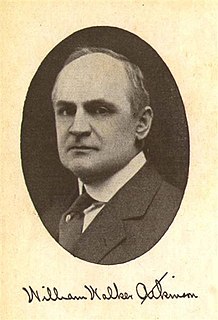A Quote by Thomas Adams
Alas! that the farthest and of all our thoughts should be the thought of our ends.
Related Quotes
We are sending out thoughts of greater or less intensity all the time, and we are reaping the results of such thoughts. Not only do our thought-waves influence ourselves and others, but they have a drawing power - they attract to us the thoughts of others, things, circumstances, people, 'luck', in accord with the character of the thought uppermost in our minds.
Affirmations are quality ideas and quality thoughts. The quality of our thoughts reflects the quality of our life. Hence, if we were to raise the quality of our thoughts, we would automatically improve the quality of our life Affirmation literally means to validate or confirm. So when we think a thought over and over again, we are validating or confirming it as the truth Using affirmations on a daily basis is one of the easiest things we can do to change our lives.
In the new alchemy, we have a similar kind of way of thinking. Our internal space includes our intuitions, our thoughts, our senses and our feelings, and from these we construct or build a picture of the outside world. From intuition and thought, we construct time. We also construct space from thought and our sensations. From our senses and our feelings, we experience energy, and from our intuitions and our feelings, we experience motion.
... poetry is not a luxury. It is a vital necessity of our existence. It forms the quality of the light within which we predicate our hopes and dreams toward survival and change, first made into language, then into idea, then into more tangible action. Poetry is the way we help give name to the nameless so it can be thought. The farthest horizons of our hopes and fears are cobbled by our poems, carved from the rock experiences of our daily lives.



































